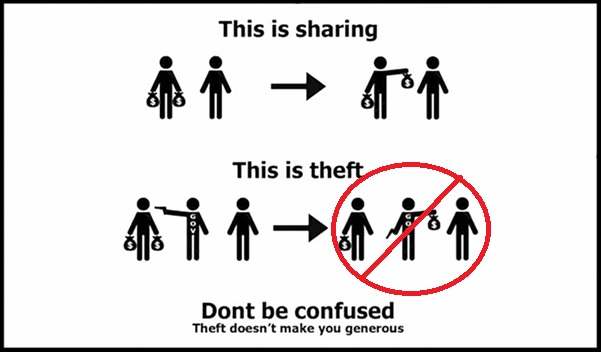March 18, 2025 by Dan Mitchell @ International Liberty
Government is far too big today and it will become an even bigger burden in the future because of demographic changes and poorly designed entitlements.
There’s no way to fix this problem without a major effort to shrink the redistributive state, as depicted by this modification of a libertarian meme.
That means entitlement reform, but many recipients will object. They will argue that they deserve money from government. Some of them will even argue that they have “earned” their benefits.
That’s an interesting argument when looking at programs with dedicated revenues, such as Social Security and Medicare.*
But there are many other types of spending that are unambiguously handouts. What’s the case for and against reducing those goodies?
Let’s look at an example. The New York Times has an editorial asserting a major MAGA attack on higher education. Not just an attack, but a step toward authoritarianism.
But much of the argument is based on their objection to a reduction in handouts and subsidies. Here are some excerpts.
When a political leader wants to move a democracy toward a more authoritarian form of government, he often sets out to undermine independent sources of information and accountability. …The weakening of higher education tends to be an important part of this strategy. …Mr. Trump’s multifaceted campaign against higher education is core to this effort to weaken institutions that do not parrot his version of reality. Above all, he is enacting or considering major cuts to universities’ resources. The Trump administration has announced sharp reductions in the federal payments that cover the overhead costs of scientific research… Vice President JD Vance and other Republicans have urged a steep increase of a university endowment tax that Mr. Trump signed during his first term. …Mr. Trump is squeezing higher education in other ways too. The Education Department let go of about half its work force, potentially making it harder for students to receive financial aid. The virtual elimination of the U.S. Agency for International Development led to the cancellation of $800 million in grants to Johns Hopkins alone. …The nonfinancial parts of the administration’s campaign against higher education are also alarming.
This is not persuasive, at least with regards to the accusation that Trump wants to be an authoritarian.
Telling an interest group that they no longer have easy access to other people’s money is not oppressive.
If the New York Times or university presidents want to make an argument (and they do) that universities should get handouts because they will generate a positive rate of return, that certainly legitimate.
And I surely would agree that dollars spent on scholarly research are more likely to generate positive outcomes than ordinary redistribution spending.
But, at the risk of repeating myself, cutting off the flow of money to higher education is not authoritarianism.
By the way, the NYT‘s editorial does acknowledge that universities have made mistakes.
Too many professors and university administrators acted in recent years as liberal ideologues rather than seekers of empirical truth. Academics have tried to silence debate on legitimate questions, including about Covid lockdowns, gender transition treatments and diversity, equity and inclusion. A Harvard University survey last year found that only 33 percent of graduating seniors felt comfortable expressing their opinions about controversial topics, with moderate and conservative students being the most worried about ostracization.
This is one of the reasons why I want the federal government out of education. Including higher education.
Let colleges and universities rise and fall depending on consumer demand. Let them attract or not attract research funds based on merit rather than political pull.
*Regarding “earned” entitlements, there is a somewhat close relationship between Social Security taxes paid and Social Security benefits received. But there are nonetheless two problems: 1) a big decline in the numbers of workers compared to retirees, leading to massive fiscal shortfalls, and 2) workers could enjoy far more retirement income if they could shift their payroll taxes to personal retirement accounts. In the case of Medicare, the average person gets $3 of benefits for every $1 of taxes they paid.

No comments:
Post a Comment